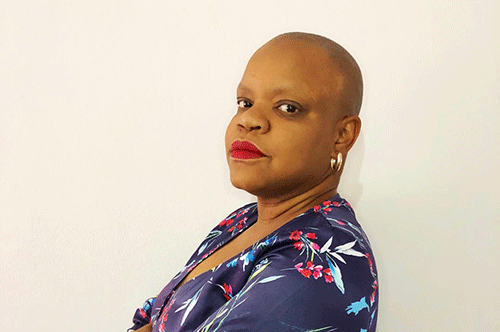Lucia Bopoto, a creative copywriter and brand communication strategist, has embarked on a new journey as a cancer awareness advocate following her diagnosis of breast cancer, just like her father.
Despite facing cultural stigma and personal concerns, she courageously uses her creative talents to educate others about the importance of proactive health checks and self-care.
The Loeries awards-nominated Bopoto uses creative language to educate people. Loeries is a non-profit company administering awards for the brand communications industry in Africa and the Middle East.
Her journey began with a personal connection to cancer, as her father battled breast cancer, and inspired her with his openness about his experience.
Reflecting on her father’s wisdom, she emphasised the importance of breaking the silence surrounding diseases, and sharing experiences to benefit others.
Bopoto’s own diagnosis was met with hesitation and worry, exacerbated by cultural taboos surrounding cancer and concerns about public perception. However, she has chosen to confront these challenges head-on, leveraging her creative prowess to raise awareness and encourage proactive health measures.
She added that it took a little bit of time, but at first it shattered her because she had to stop working as a lot of things were unpredictable during treatment. As time went on, she realised that she has to start trying things with confidence because she is naturally shy.
“I am someone who advocates for social equity for social issues. So, after being diagnosed, the next logical thing to do is to show people that if I can face this, then everyone else can,” said Bopoto.
Through her advocacy work, she aims to empower individuals to prioritise their health and overcome barriers to seeking medical care. By sharing her own story and insights, she hopes to dismantle stigma, and foster a supportive community for those affected by cancer.
Bopoto is still on treatment and recently had surgery.
Breast cancer is one of the most common cancers which affects women and people assigned female at birth (AFAB). It happens when cancerous cells in your breasts multiply and become tumours. About 80% of breast cancer cases are invasive, meaning a tumour may spread from the breast to other areas of the body.
Breast cancer typically affects women aged 50 and older, but it can also affect women and people AFAB who are younger than 50. Men and people assigned male at birth (AMAB) may also develop breast cancer.
Living with breast cancer may not be easy, as one may have days when they feel overwhelmed by their situation.
“I believe awareness helped my dad diagnose his breast cancer early because he had spoken to his friend some months before, who had lung cancer. The friend encouraged him (her dad) to read more about cancer and he did extensive research, so he could tell which cancer he had. So, I have a personal story to tell that someone close to my heart had cancer,” she continued. In the community, she helps people with cancer to boldly speak up, and for those who have given up, she encourages them to go for check-ups and never lose hope.
At an earlier Cancer Day commemoration, she did a talk at a church in Katutura. Afterwards, someone came to her and said they had the same journey of cancer, but was too shy to speak up because of prejudice.
“I have not faced any challenges, and people have been supportive and welcoming. As welcoming as they are, I hope they are getting their check-ups,” she noted.


